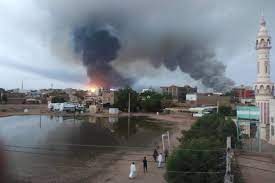
Whats behind warning the military against spreading fake victories
Walid Al Noor
On November 30, the Armed Forces issued their remarks, warning unnamed parties that they were spreading irrelevant victories and attributing them to the Armed Forces.
Since the start of the war, the absence and prolonged suspension of official media, the discontinuation of all radio, private channels, local newspapers, satellite channels and the restriction on existing journalists until their channels were forced to evacuate them to safe areas and away from areas of clashes, a number of pages followed by thousands of citizens, run by activists and amateurs who occupied the official media, have begun to spread desirable and unreal news.
Some media professionals have taken social media as a battleground between them and their political opponents, dividing citizens into patriots and non-patriots and possessing national instruments granted by those who love them and accusing them of hating them for employment. Some influential social media have turned to or against, and many have remained silent and bowed to the storm that has damaged the facts.
Some media professionals, who do not differentiate between the soldier and the officer and have not specialized in military and military strategies, have turned to satellite channel speakers, provide misinformation that has harmed the armed forces more than military battles, directing and speaking on behalf of the army despite the presence of a high-ranking spokesperson and official army platforms.
The Sudans war, which lasted for more than seven months, could not be covered impartially by any independent media. The coverage was via amateur or satellite, because the parties did not want journalists on the ground, but at the beginning of the war journalists in areas of clashes were harassed and accused of helping each other, so some channels preferred to evacuate their crew to their security areas and work from the distance.
Today, all Sudanese in Khartoum, states with security tensions, ask when the war will stop, until we return to our homes, and no one can answer that question.
They raise questions for the media as they have sources of news, analyze current events and identify indicators in which direction they are going, but no one knows the answer. The army commanders speak of negotiation and soon return that the war will not stop until the end of the insurgency. Even the Jeddah platform from which some leaks began to emerge close to reaching an agreement between the army and rapid support, some platforms deny.
The absence of the Sudanese media on the battlefield caused a lack of knowledge of what was going on in Khartoum State, but citizens received news through statements and counter-statements. Some media enthusiasts turned to opinion leaders distributing false and misleading news that killed some citizens who believed the news but found the clashes in front of them.

